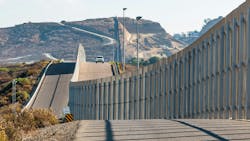South American Gang Challenges American Law Enforcement
By Michael Brown, Global Director of Counter-Narcotics Technology at Rigaku Analytical Devices
American law enforcement is facing a new challenge in the form of a new South American gang establishing itself on U.S. soil. The gang, Tren de Aragua, was born in Venezuela and is renowned for its brutality. Its traditional criminal focus is on exploitative activities, including human smuggling and trafficking, gender-based violence, money laundering, and illicit drug trafficking. Earlier this year, the U.S. Department of the Treasury’s Office of Foreign Assets Control (OFAC) sanctioned Tren de Aragua, as a “Transnational Criminal Organization.”
Recently, Tren de Aragua moved its operations center to Juarez in the Mexican state of Chihuahua. This is a strategic move by the gang as it establishes a command-and-control center in co-operation with Mexico’s cartels, and safely out of U.S. jurisdiction but logistically close enough to America – a nine-mile drive from El Paso, Texas – to manage and direct operations without fear of disruption by the DEA or any other US authorities.
Juarez has gained notoriety as one of the main staging points for smuggling narcotics and illegal immigrants into America. As such, it is the center of significant cartel activity. Today, the Sinaloa Cartel and Jalisco New Generation Cartel dominate the city. Tren de Aragua has allied with these cartels, adding narcotics trafficking to its criminal portfolio, with American cities as its target.
An open market awaits
The market for illegal narcotics in America is large and profitable, and the cartels have long been actively smuggling their products into the country. Over the last few years, the traditional routes and techniques for smuggling have been boosted by a new option, one that not only allows narcotics smuggling but also people trafficking. Due to the current ease of entering America via the porous southern border without the correct documentation, the cartels have smuggled their own and Tren de Aragua members into the country disguised as migrants, sending them to sanctuary cities, and states identified as easy to operate in. By June 2024, CBP data, reported that there were 1.44 million reported border encounters in the first six months of 2024 alone.
The social benefits that sanctuary cities offer make life easier for migrants, both those looking for a new life and criminals. Unsurprisingly, migrants go where they feel at home, in communities where they either know people or share commonalities, such as language and culture. This benefits gangs, as their first target will be their own communities. If people are granted these generous benefits, they can often be subject to extortion and other forms of gang exploitation. These communities are also a good place for gangs to hide, as their neighbors know who they are and the consequences of talking out of turn. This has created an opportunity for Tren de Aragua to target migrant communities for extortion.
All that this criminal gang is doing is capitalizing on vulnerable and impoverished migrant communities that are relocating to the United States. These communities are less likely to request law enforcement assistance and pay the ‘tax’ to the gang. Sanctuary cities, where large Latin migrant communities are being reestablished, represent the perfect targets for Tren de Aragua to establish new centers of gravity to set up new extortion and drug trafficking networks. They will spread to other non-sanctuary cities in due time.
Progressive or regressive
Additionally, for gang members, sanctuary cities offer additional benefits. ‘No-cash bail’ has been adopted in some states, including New York and California, with predictable results. The recent attack on police officers in New York is only one example of Tren de Aragua taking advantage of these progressive policies.
Furthermore, American police are viewed as weak by the gang because of the strict operational procedures and laws that govern an officer’s conduct. These regulations are particularly stringent in progressive jurisdictions. Conversely, in Venezuela, the police deal with Tren de Araguar under a very ‘different’ criminal justice system with very little regard for their rights.
It is not a foregone conclusion that American cities and tactical crime management may fail as the gang grows in numbers and spreads to other cities. Even in New York, law enforcement has beaten resurging crime in the past. In Rudy Giuliani’s time as mayor (1994 to 2001), crime was successfully reduced by implementing the controversial ‘Broken Windows Policing’ and ‘stop-and-frisk’ policies. Despite its success, a federal judge ruled the stop-and-frisk policy unconstitutional in 2013.
Operational methodologies
If Tren de Aragua is left to conduct its business unhindered, American cities should expect a significant increase in violent crime that will accompany the gang’s expansion. The gang’s trademark crimes include crimes like murder, rape, extortion, sex trafficking, and home invasions, which always include an element of violence. Even when its members carryout the pettiest of crimes there is always the distinct possibility of violence being used.
The current situation is an almost insignificant precursor to what will develop over time, and how the gang works. Criminal attacks occur rapidly, with extreme violence, without any concern for the harm caused to innocent bystanders. Weapons are almost always used, and gang members never operate alone.
These methodologies do not only apply to activities related to drugs or stealing cash or goods but includes police shootings. With no respect for the law, killing officers is simply part of doing business for Tren de Aragua – and these incidents gain the perpetrators significant credibility among their peers.
The additional and intentional effect of these extreme actions is to create an atmosphere of terror, which becomes a force multiplier for the narcotics cartels as it overwhelms every aspect of law enforcement on a national scale.
Overwhelmed law enforcement
Officers in sanctuary cities, and many ‘non-sanctuary cities’ are already stretched thin and are often overwhelmed by the amount of work they face with stringent restrictions on how they operate. Police departments in cities that are not ‘sanctuary cities’ are warned that all cities and towns across the country are fair game to this gang. Their criminal enterprise will spread like a criminal cancer. Currently it is operational in New York, Colorado, Illinois, and Indiana. If policies do not change in support of law and order, their nefarious activities will only increase, and officers and agencies will be inundated beyond their ability to be effective while operating in an environment of increased risk.
Federal agencies investigating major crimes can often take a year or more to wrap up a case, which means that while working on one case, many more will be put on hold until they can address them due to resource restrictions. ICE and CBP are already stretched to extremes. If the influx crossing the border increases, their productivity and effectiveness will diminish further, putting even more pressure on state, county, and city law enforcement.
Additionally, if federal policy does not change, the workload for prosecutors and the courts will increase dramatically, resulting in an inability to address cases effectively. All law enforcement personnel and agencies will rush from one emergency to another, trying to put out fires at the expense of an ever-growing caseload, often getting in each other’s way.
Accompanying this pressure, Tren de Aragua will set the trend for anti-police violence, and officers will be open targets of extreme violence while being constrained in their ability to defend themselves.
The solution starts at the top
Avoiding this worst-case scenario requires drastic changes to political policy, starting with better border control. Migrant vetting and anti-narcotics laws and policies must be updated, implemented, and executed at a federal level. Moreover, those in the country illegally must face the consequences. While this approach may be difficult for many it must be remembered that the law is the law!
Federal policy must not allow the law to be divided into tiers, one for citizens and a lesser, more lenient one for migrants. Anyone who breaks the law must face the same justice system, no matter who they are. If migrants choose not to play their part in a free, fair, and law-abiding society, they must face the law and deportation.
While national policy must change, it is important to note that America does not need to develop and implement new laws or law enforcement strategies or tactics. Most of the strategies needed to degrade Tren de Aruguar are already battle proven having been used in the past. Broken Window and stop-and-frisk policies worked in the past, not only to stop petty crimes, but also to take weapons and narcotics off the streets.
An integrated and multidisciplinary team comprising various branches of law enforcement agencies at a federal, state, and local level is required. The combined force must incorporate intelligence services, from local police informants to data collected by federal agencies, and rapid reaction squads dedicated to responding in real time and supporting local law enforcement.
It must also include officers on the streets, empowering them with access to analysis and insight to protect and assist them in their jobs. They should also be supplied with the tools to send new information back to a central database where it can be combined with other intelligence sources. Officers' relationships with their communities will be a goldmine of information if a trust relationship can be established—which it must.
There is a historical precedent for this approach. La Mara Salvatrucha, better known as MS13, originated in El Salvador and quickly grew in California before spreading to Long Island in New York. MS13 was so successful that in 2018, Attorney General Jeff Sessions announced a new cross-agency task force aimed at zeroing in on MS-13, designating the gang as a priority for “a multiagency task force.”
This action was possible because the administration recognized the threat MS13 posed to America and its citizens and decided to act. Drawing on the experience and skills of multiple law enforcement agencies and combining their efforts to address the problem, the task force successfully degraded MS13.
A unified, all-encompassing approach to Tren de Aragua will achieve a similar result, degrading the criminality expanding in America. Working together will unleash law enforcement experience and capabilities gained over many years, creating a significant force that degrades the gangs and the cartels’ capacity for terror.
A critical decision
Degrading Tren de Aragua is not an option. The implications of taking a soft approach go further than the gang and include supporting enhanced American operations by the narcotics cartels. Should existing authorities not be unshackled, the country will see an explosion of violent crime spreading at an ever-increasing rate.
Law enforcement already has the skills, assets, tools, techniques, and resolve to do the job. Beating Tren de Aragua will not be a simple task. Still, as history has shown, the coordinated integration of various agencies increases their effectiveness tenfold, a force that not even Tran de Aragua can overcome.
We have a solid window of opportunity and can beat this cancer and send a strong message to other nefarious individuals and gangs.
About the Author
Michael Brown is the global director of counter-narcotics technology at Rigaku Analytical Devices. He has a distinguished career spanning over 32 years as a Special Agent for the Drug Enforcement Administration (DEA). Most recently he was the DEA Headquarters staff coordinator for the Office of Foreign Operations for the Middle East-Europe-Afghanistan-India. Prior to that he served as the country attaché in India and Myanmar providing foreign advisory support for counter narcotic enforcement. Contact him at [email protected].

